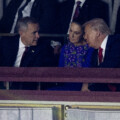
This year marks the 60th anniversary of Canadian philosopher George Grant’s Lament for a Nation: The Defeat of Canadian Nationalism, a seminal work that reshaped Canadian political discourse. Published in 1965, Grant’s critique of American cultural dominance and technological modernity challenged Canadians to reconsider their national sovereignty and identity. To mark the occasion, this summer, The Hub will feature a series of essays from big thinkers exploring the book’s enduring legacy and how its insights remain vital to understanding Canada and its relationship with the United States today.
On the surface, the timing of the 60th anniversary of George Grant’s Lament for a Nation could not be more perfect. President Donald Trump’s repeated comments about Canada becoming the “51st state” have inspired a genuinely organic groundswell of nationalistic sentiment across Canada. Walking down the street, one encounters people (usually with graying hair) wearing T-shirts emblazoned with “Elbows Up!” or baseball caps adorned with “Canada is not for sale.”
Surely, Grant would rejoice, perhaps even donning such a hat himself? While he predicted that the defeat of Canadian nationalism meant that Canada was doomed to disappear and inevitably be swallowed up by the United States, some see this patriotic reaction to Trump as proof that Canada was perhaps not destined for continental absorption after all.
So then why read Grant anymore? If Canadian nationalism has been reborn, then surely Grant’s prediction of its death was either wrong or premature.
The fundamental flaw of contemporary Canadian nationalism
To answer this, we must understand why Lament is a widely misunderstood book, especially by those who enthusiastically embraced it as a call to arms after reading it. Lament was never intended as a manifesto for Canadian nationalism. It was a eulogy for a nation and a philosophical account of the impossibility of Canada in the modern era.
The “elbows up” nationalism on display today perfectly illustrates Grant’s arguments. Canadian nationalism, in its Laurentian and commercialized expressions, cannot offer anything beyond banal progressive moralism to define what it means to be Canadian and how it is different from being American. While this progressive identity exists in conscious reaction to the perceived reactionary barbarism of regressive red state America, it mistakenly identifies the United States as a regressive force instead of recognizing it as the zealous and dynamic proponent of capital-P Progress that the world has ever seen.
Today, Canadian nationalism is left on philosophically unsustainable grounds. Our progressiveness cannot be the basis for distinguishing us from America and be able to resist what Grant calls “continentalism.”
The Universal and Homogeneous State
Lament is part political commentary, part philosophical analysis. The deeply flawed protagonist of the book is John Diefenbaker, whom Grant vigorously defends. The early chapters of Lament outline the fall of the Diefenbaker government and criticize Canada’s Laurentian establishment for giving in to pressure from the John F. Kennedy administration to place nuclear missiles on Canadian soil. Grant warned that this move would effectively end Canadian sovereignty and turn the country into a “branch plant satellite” of the United States, part of its growing global empire.
Grant articulated what he thought made Canada distinct: a common desire for a society that was more ordered, restrained, and promoted the public good. This desire united British and French Canada. This “Toryism” required an energetic role for the state in maintaining and protecting Canada’s sovereignty, from nation-building projects like railways to public broadcasting institutions. Canada is defined in contrast to America, a nation founded on revolutionary liberal and progressive principles. Canada’s distinctiveness was its “Toryism.”
Misunderstanding Grant lies in misunderstanding how he views the United States. Lament inspired a generation of Canadian nationalism, primarily a left-wing, socialist nationalism that saw the evils and might of American capitalism as something to be resisted through a more socialistic vision of Canada. Grant’s vocal opposition to the Vietnam War helped solidify his role as a key early figure in the emergence of left-wing “Waffle” nationalism. But the idea that American imperialism could be resisted through ordinary politics misunderstands the argument.
The fifth chapter of Lament is the key philosophical section, outlining Grant’s core argument. He sees America as central to the rise of the “Universal and Homogenous State (UHS),” a concept derived from Georg Wilhelm Friedrich Hegel, and specifically Alexandre Kojeve’s influential interpretation of Hegel.
The defining mantra of modernity for Grant was Progress. This Progress is ultimately about mastering and the complete removal of any limitations on man’s will. The engine of Progress and this quest for mastery over the world is the enormous power of modern technology. But this new technological civilization cuts us off from the eternal horizon. Tied up in this notion of Progress and rewriting of man’s ends is the elevation of man’s freedom and equality. Put all this together, and modernity is a project, concerned with the complete elimination of human limits and constraints, and a desire to build a society of universal mutual recognition, where all human beings recognize each other as equals.
The end of this is the emergence of the universal and homogenous state. This is what Francis Fukuyama’s also famous and misunderstood book The End of History and the Last Man is all about. This is the endpoint of Progress. All particularities are dissolved, all human beings are satisfied by mutual recognition of one another, and man is freed from the limitations and restraints of both nature and tradition. This all sounds very abstract, and is why Grant’s argument is not easy to understand.
America, for Grant, was seen as the centre and central driver of the emergence of the UHS. American technological superiority, capitalism, and small-l revolutionary liberalism make America the most progressive nation ever to have existed. American technology and capitalism would spread UHS globally. The UHS is not just some sort of one-world government; it is a world in which liberalism becomes hegemonic without any challengers, man’s highest end is his freedom, and we are cut off from any kind of higher horizon.
Progress and the impossibility of Canada
What made Canada distinct for Grant was precisely that we are not fully liberal. Canada was born to try and preserve a particular kind of society in the face of modernity; thus, the “impossibility of conservatism in our era is the impossibility of Canada.” What makes Canada distinct from America is that it resists America’s relentless pursuit of progress, but also that “as Canadians we attempted a ridiculous task in trying to build a conservative nation in the age of progress, on a continent we share with the most dynamic nation on earth.”
You don’t have to be a full-blown Grantian or a reactionary to recognize that Grant’s characterization of America as a dynamic and progressive force in terms of driving technological change and capitalism is fundamentally correct. Even Karl Marx understood that capitalism, as an engine of history, was the most progressive force the world has ever seen. Capitalism erodes and dissolves all particularities, traditions, and customs as everything is subject to the power of the almighty dollar. To quote Marx, “All that is solid melts into air, all that is holy is profaned.” But what Grant recognized is that liberalism and its quest to privatize the pursuit of the good and reduce morality to questions of freedom, choice, and consent is the handmaiden of capitalism.
The relationship between liberalism and technology
To the contemporary reader, Grant’s argument can be disorienting and deeply unsettling. In both public and private life, liberalism and the language of progress are the waters we swim in. We do not know how to articulate arguments in the public sphere that are not rooted in the language of freedom, choice, autonomy, and consent. We may hold non-liberal beliefs and live non-liberal lifestyles to a certain extent, but this is entirely confined to the private sphere. As Grant put it, “Some like pizza, some like steaks; some like girls, some like boys; some like synagogues, some like mass. But we all do it in churches, motels, and restaurants indistinguishable from the Atlantic to the Pacific.”
Liberalism is also driven by the desire to master and control nature, including human nature. The liberal focus on freedom and autonomy dissolves customs and frees us from traditions that restrain us. Just as technology can help us overcome physical and natural limitations, liberalism helps us overcome the limitations imposed on us by parochial loyalties and particularities. Liberalism, capitalism, and technology are all, for Grant, deeply interconnected tools that drive towards the same thing.
Again, you don’t have to agree with Grant to still understand how America should be understood as a progressive force, even if we reduce our understanding of America to a gun-loving, bible-thumping, anti-abortion red state caricature. Progress should not just be reduced to contemporary partisan progressivism. Progress, properly understood, is tied up with modernity itself: capitalism, liberalism, and the technological pursuit of human mastery of the world.

Sunlight shines through the flags of Canada and the United States, held together by a protester outside on Parliament Hill in Ottawa, on Saturday, Feb. 1, 2025. Justin Tang/The Canadian Press.
The hollow promise of “elbows up” nationalism
Nothing about contemporary Canadian nationalism suggests there is anything more to Canada beyond shallow progressive and capital-L Liberal platitudes. Canadian identity revolves around public health care, myths about being a nation of peacekeepers, of being more socially progressive than those awful Americans, and paying homage to the CBC even if few people are actually watching it.
The revived “We are Canadian” commercial played by actor Jeff Douglas is a revealing indictment of this shallow nationalism. It roots Canadianism in ketchup chips and poutine, in cliches about being polite and friendly, and snide comments about Canada’s superiority to those barbaric Americans. “Elbows Up,” or “Molson Canadian” nationalism, really amounts to nothing more than combining progressive blue state values with commercialized instantiations of Canadian culture through mass market cuisine.
Seriously considering Grant’s argument makes it blindingly obvious why shallow, puerile, and hollow “Elbows Up” Canadian nationalism is wholly inadequate at actually providing Canada with a substantive account of what makes Canada distinct from the United States. Liberalism and progressivism cannot serve as the basis for any kind of distinctive national identity for Canada, because if that is all we are, then we are already a branch plant satellite of America’s dynamic and progressive empire. We may still exist as a nation, but we are already an entrenched province of the universal homogenous state.
Sixty years after it was written, Lament reads as an increasingly radical book. Grant was not railing against American jingoism and imperialism in conventional terms; he was lamenting the disappearance of Canada in the face of a modern technological civilization that erases all particularities, traditions, and local cultures. His resistance wasn’t about resisting the pull of one powerful country; it was about resisting modernity itself.
You can dismiss Grant as a reactionary crank, as he was by many in the latter part of his life, but his arguments about what once made Canada distinct and what made it doomed to disappear should be taken seriously and challenge us to look critically at the resurgent nationalism of the last few months. If Canada is nothing more than a blue state with poutine, then we are in many ways already the 51st state.
Even today, reading Grant opens us up to a bigger philosophical horizon, concerned not just with mundane partisan considerations, but big questions about modernity and Progress itself. Grant still has the capacity to shake us out of our comfortable and complacent mindsets and make us think deeply again about Canada’s fate in the face of modern technological civilization that now rules in nearly every corner of the planet.








